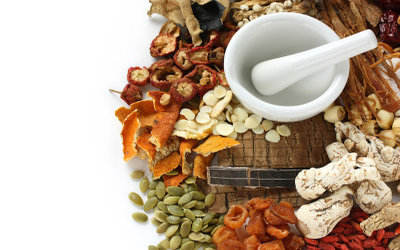5 Things About Chinese Herbal Medicine That Will Impress You
Are you intrigued by Chinese medicine’s profound philosophy, but don’t have much of a grasp on what it’s all about? Here’s a quick guide to what lies behind one major aspects of Chinese medicine: Chinese herbal medicine.
What is Chinese herbal medicine? Just herbs?
As the name suggests, herbs are the main ingredient in Chinese herbal medicine. Indeed, Chinese herbology recognizes more than 3,200 different types of herbs. Some prominent examples are ginseng and astragalus (root is used).
But that’s not all. Chinese herbal medicine also utilizes a slightly less mind-numbing 300 different minerals, insects, sea-creatures, and animal extracts. Cinnabar (ore of mercury), silkworm, seahorse, and rhinoceros horn, are some examples.
The different herb and non-herb ingredients are often combined as formulas, of which there are more than 400 widely known permutations.
So it’s the chemical properties of the herbs that are important, right?
Like Western medication and vitamins, Chinese herbs are chemical agents with illness-treating properties.
But the chemical component of Chinese herbs is not the sole consideration for an effective treatment. Rather, the level of energy output of each formula that goes toward restoring the body’s yin-yang balance is the key determinant.
With so many herbs and ingredients, how do they know which to combine?
In most cases, four types of herbs are included in the formula, categorized as: “emperor,” “minister,” “assistant,” and “ambassador.” There can be more than one of herb of each type.
These herbs are not casually termed. The “emperor” targets an illness’ main symptoms and underlying causes, while the “minister” treats the accompanying symptoms and their underlying causes. The “assistant” harmonizes the formula and eliminates possible toxins and side effects. Finally, the “ambassador” is there to get the formula to the afflicted meridians and organs.
Before being administered to a patient, these four herb types are made into a decoction (medicinal liquid) or capsule and pill variant. After that, like a proper, functioning bureaucracy, these herbs perform their own roles, and combine for efficient “governance” of illnesses.
*Our content is not intended to provide medical advice or diagnosis of individual problems or circumstances, nor should it be implied that we are a substitute for professional medical advice. Users / readers are always advised to consult their Healthcare Professional prior to starting any new remedy, therapy or treatment. Your Wellness Group accepts no liability in the event you, a user of n-gage and a reader of this article, suffers a loss as a result of reliance upon or inappropriate application of the information.


Comments are closed.